United Nations (CNN) -- Syria will soon complete its
official investigation into last week's massacre in Houla, the
country's U.N. ambassador said Wednesday. "The national commission
of investigation in Syria will terminate its investigation tomorrow or
after tomorrow," Bashar Jaafari told reporters at the United Nations.
"And then you will hear, all of you ... the results of this
investigation. And all of us will know for sure the identity of the
perpetrators."
Syrian officials have
repeatedly denied government involvement in the massacre that left more
than 100 people dead, about half of them children. But Rupert Colville, spokesman for the U.N. human rights office, said Tuesday that it's "clear" government forces were involved.
Most died as a result of
"summary executions" by "armed men going into houses and killing men,
women and children inside," Colville said, saying the Shabiha militia, a
government militia group, appeared to be behind the executions.
Susan Rice, the U.S.
ambassador to the United Nations, said the massacre was carried out "by
every indication, by the Shabiha militias acting on behalf of the
government. We think it's quite clear-cut."
Since the conflict began
more than a year ago, President Bashar al-Assad's regime has blamed
violence against civilians on "armed terrorist groups," a line Jaafari
continued Wednesday.
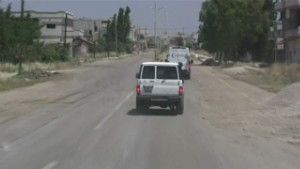
Houla after the massacre, in the war zone
Those behind the "heinous
crime," which was "unjustified and unjustifiable," will be brought to
justice, Jaafari said. He also argued that other countries are
supporting groups that are smuggling weapons into Syria.
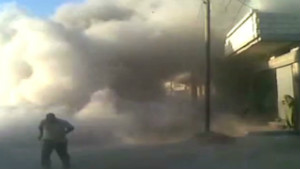
Bodies ripped apart in Houla massacre
The remarks came after a
meeting of the U.N. Security Council, in which countries sought new ways
to increase the pressure on the regime.
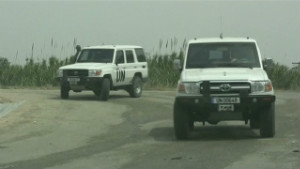
U.N. monitors in Syria fired upon
Rice said after the
meeting, "We certainly agree with Kofi Annan that this is a moment where
we have reached, in effect, a tipping point."
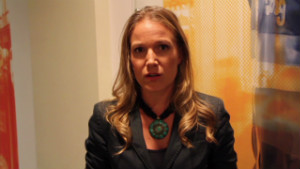
Arwa Damon on Syria
Annan, special envoy to
Syria for the United Nations and the Arab League, who has pushed a
six-point peace plan, used the phrase "tipping point" Tuesday.
"I think we may be
beginning to see the wheels coming off of this bus," Rice said. "And
that means that what happens next and the steps that are taken by the
Syrian authorities and by this council could well be dispositive."
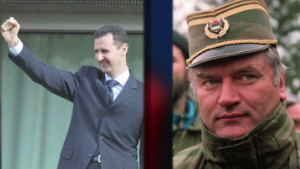
Syria massacre 'seen before' in Bosnia
"The political process,
which is so crucial to the success of any transition, which is the
purpose of the Annan plan, is thwarted by the ongoing, escalating,
expanding violence perpetrated by the government, and the reality that
the opposition cannot possibly be expected to come to the table while
the violence is intensifying, escalating and the government is lying
about it," she said.
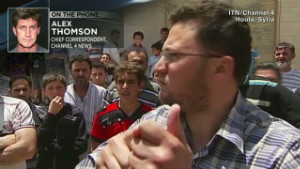
Reports of civilian militia attack
But Jaafari insisted
that his government was doing all it could to protect Syria's citizenry.
"We are facing terrorist armed groups -- trained, financed, harbored
and protected by some countries in the area -- Arab countries, regional
countries and internationally speaking also."
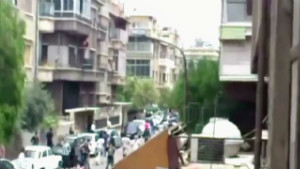 No 'plan B' for Syria right now
No 'plan B' for Syria right now
Eleven nations -- the
United States, the Netherlands, Australia, Britain, France, Germany,
Italy, Japan, Spain, Bulgaria and Canada -- announced Tuesday that they
were expelling Syrian diplomats. Turkey joined that list Wednesday,
expelling the charge d'affaires and other diplomatic personnel from
Syria's embassy in Ankara.
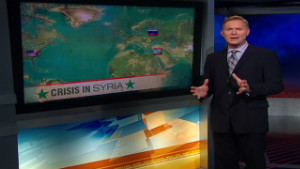
World reacts to Houla massacre
In turn, Syria said
Wednesday it was expelling the Dutch charge d'affaires from Damascus,
giving her 72 hours to leave the country.
Jaafari said the
diplomatic moves against Syria were not helping the situation.
"Sanctions, expulsions of diplomats -- this is not diplomacy," he said.
"Diplomacy is totally different."
Russia called the
expulsions of Syrian diplomats "counterproductive" and insisted that a
U.N. Security Council statement Sunday condemning the incident was "a
strong enough signal to the Syria parties."
A central question
hanging over the Security Council meeting is what steps Russia and China
will countenance. As permanent members, they have veto power, which
they have used previously to block two resolutions. Many world leaders
assailed the two nations, saying they were preventing steps that could
stop the violence. But the two countries said they were seeking more
balanced resolutions.
Both have major trade deals with Syria.
While no nation is openly pushing for military action, French President Francois Hollande has said it cannot be ruled out.
China and Russia spoke out Wednesday against such an idea.
"China opposes military
intervention and does not support forced regime change," said Liu
Weimin, a Chinese Foreign Ministry spokesman. "The fundamental route to
resolving the Syrian issue is still for all sides to fully support
Annan's mediation efforts and push all the relevant parties to carry out
diplomatic dialogue."
"One cannot take
decisions on military operations in Syria by being guided by only
emotions," said Russian First Deputy Foreign Minister Andrei Denisov,
according to Russian news agency Itar-Tass.
Denisov also said "the
Russian position is not formed on the basis of emotions, which our
respected French partners have unfortunately not escaped in the
formulation of their position," according to Russian news outlet RIA
Novosti.
In Washington, State
Department Deputy Spokesman Mark Toner said U.S. officials were not
putting all their hopes into the Annan plan.
"We're also continuing
with these other options that we're pursuing, which is support for the
opposition, humanitarian assistance, working through the (opposition
group) Friends of Syria to increase financial and political pressure on
Assad," he said.
In a statement from a
spokesman, the Free Syrian Army said it was giving the Syrian regime
until noon on Friday to implement the Security Council resolutions or it
would stop complying with them.
"Immediately halting
gunfire and all violence, pulling out all the troops, tanks and
machinery from the cities, towns and residential areas, allowing
humanitarian aid to reach all stricken areas, releasing all prisoners
and allowing media access, guaranteeing the freedom to demonstrate, not
attacking the U.N. monitors like what happened in several areas, and
entering true and serious dialogue through the United Nations in order
to hand over the power to the people," said the spokesman, Col. Qasim
Saad Eddine.
"Our national, moral and
humanitarian duty make it necessary for us to defend and protect our
civilians and their cities, towns, blood, and dignity," the statement
said. "And this right to protect ourselves does not go against
international laws and norms."
The United States
announced Wednesday it was sanctioning a Syrian bank that al-Assad's
regime was using to circumvent other sanctions. The U.S. Treasury said
its action will help isolate the regime.
Peter Wittig, Germany's U.N. ambassador, said he hoped the Houla massacre was "an eye-opener for some members of the council."
He said he hoped the
council would consider expanding the U.N. monitoring mission in Syria.
Also, he asked, "How does the council deal with violations of its own
resolutions? Because the massacre in Houla was a clear violation of the
Security Council resolution."
He added, "We have to exhaust all means to find a political solution," and "militarization, for us, is not an option."
In Washington, White
House press secretary Jay Carney took a similar tack: "Right now we
believe that, for example, on the issue of providing lethal aid, that
that's not the course of action that's the right one to take for this
country," he told reporters. "We're providing nonlethal assistance and
humanitarian assistance in coordinating with other nations and providing
support for the opposition as it forms itself."
Since the uprising in Syria began nearly 15 months ago, Syrian government forces have engaged in a crackdown on the opposition.
At least 46 people were
killed Wednesday, including 14 in Homs, 12 in the Damascus suburbs and
10 in Daraa, the opposition Local Coordination Committees of Syria said.
The LCC also said regime forces launched tear-gas grenades at Aleppo
University students and made arrests.
Meanwhile, the head of
the U.N. observer mission said 13 bodies were discovered Tuesday night
in the area of Assukar, 30 miles east of Deir Ezzor in the eastern part
of the country.
"All the bodies had
their hands tied behind their backs and some appear to have been shot in
the head from a short distance," according to a statement from the
office of Maj. Gen. Robert Mood.
Mood called the act "appalling and inexcusable" and urged "all parties to exercise restraint and end the cycle of violence."
Syria, on the state-run
news agency SANA, said 25 "army, law enforcement and civilian martyrs"
were buried Wednesday. Also, an "armed terrorist group" attacked an oil
pipeline in Deir Ezzor, SANA reported.
CNN cannot confirm death
tolls or reports of violence from Syria because the government limits
access to the country by foreign journalists.
Jaafari insisted Syria
supports Annan's six-point plan to halt the violence in Syria, and
reiterated that his government is acting only against terrorist groups,
but finds itself in a difficult position.
"On one hand, if we
deploy our army and the law enforcement forces to protect the civilians,
somebody would come and criticize us -- Why are we doing that? But if
we let the people get killed by the terrorist groups, then we will be
also blamed again -- Why you didn't protect your civilians?"
Jaafari described the
talks between al-Assad and Annan during the former U.N. secretary
general's visit to Damascus as "good," adding that Syria supports his
peace plan. But, Jaafari said, other nations must cooperate if peace is
to be achieved.
"President Assad
reviewed with Kofi Annan the progress that has been achieved by the
Syrian government in implementing his plan," Jaafari said. "However,
President Assad reminded Mr. Kofi Annan of the necessity to have
everybody else committed to respecting his plan and to stop financing
and arming and smuggling weapons into Syria."
(Taken from: http://edition.cnn.com)

